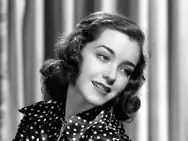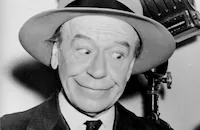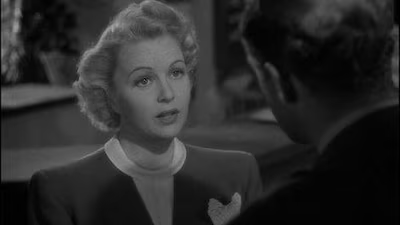Seven Sweethearts

Brief Synopsis
Cast & Crew
Frank Borzage
Kathryn Grayson
Marsha Hunt
Cecilia Parker
Peggy Moran
Dorothy Morris
Film Details
Technical Specs

Synopsis
Reporter Henry Taggart arrives in the quaint town of Little Delft, Michigan, to cover the hamlet's annual tulip festival, and meets Papa Van Maaster, the local hotel proprietor, who strongly believes that the town's easy-going, old-fashioned ways are the best. Papa has seven daughters, all beautiful, and all but the oldest, spoiled Regina, have boys names and work at the hotel. New Yorker Henry is at first befuddled by the casual ambiance at the hotel, but soon brightens when he meets Papa's youngest and feistiest daughter, Billie. Although it is early May, constant rain prevents Henry from taking photographs for his article and forces him to extend his stay, during which he learns more about Delft's way of life. One evening, he meets vain and lazy Regina, who is determined to be an actress. Because Regina is unmarried, family tradition dictates that her younger sisters cannot marry, even though all but Billie are secretly engaged. The family encourages Henry to take a drive with Regina and he tries to impress her with talk about his "Broadway" friends. He still prefers Billie, who tells him that Regina is Papa's favorite and asks him not to encourage her to go to New York. He asks Billie to be the "Dutch" girl in his pictures, and the next evening, all of the sisters except self-centered Regina, who has a cold, notice the blossoming romance. During a ride in the rain, Henry confesses to Billie how much he likes her, and tries to kiss her, but she says that she does not want to be familiar with a guest. The next day, after church, Miss Robbins, a long-standing guest at the hotel, tells Henry that Billie is in love with him, and he admits that he wants to marry her. At the festival, the townspeople are all dressed in traditional Dutch costumes and go through various rituals, including the washing of the street and buildings. Papa is in the marching band and the girls perform a wooden shoe dance, during which Henry grabs Billie away and proposes. She loves him, but tells him that she could not leave their home because, like flowers, she would die if transplanted. She also tells him about the eldest daughter tradition. Not dissuaded, Henry plans to ask Papa for Billie's hand, but when he and Billie arrive back at the hotel, Regina is angry that he is no longer interested in her. Jan Randall, a Viennese musician who has lived at the hotel for several years, has secretly had a crush on Billie, but, on Henry's suggestion, decides to pursue Regina, whom he had thought unobtainable. Henry then goes to Papa, who guesses that he is asking for his daughter's hand, but thinks that Regina is the one. When Papa ecstatically fetches Regina, Henry is so flustered that he cannot explain what is wrong. Regina knows the truth, but secretly tells Henry that she wants him to take her to New York right away and threatens to tell Papa if he tries to talk his way out of it. In his panic, Henry asks the sisters and Miss Robbins to help him elope with Billie, but she refuses because of the tradition. She and the other sisters then try to talk Regina out of going to New York and hurting Papa. When Regina callously says she doesn't care what Papa wants, Billie slaps her. A few moments later, Papa tells Billie to go to sing her song at the festival. When she cannot continue singing and leaves the stage, Papa runs after her to see what is wrong. Henry follows them and tells Papa that he loves Billie and wants to take her to New York. Papa sadly tells them to go immediately, but after he leaves, Billie tells Henry that she could never hurt Papa by leaving and kisses him goodbye. Some time later, when Henry is in New York and completing his article on the festival, he gets a call from Regina, who is also in New York and wants to see him and meet his producer friends. As she waits for Henry at her hotel, Papa arrives and tells her that he will not stand in her way and plans to send her to the best acting schools. He also reveals that he has brought Miss Robbins and Randall with him to be her guardians. When Henry arrives, Papa reveals his plans for Regina and then "proposes" that he and Billie should marry. Papa is happy at Henry's eager acceptance because he now has a son--Henry the Eighth. Finally, at a large wedding ceremony in Delft, all of the sisters marry their fiancés, including Regina, who returns home, happily in love with Randall.

Director

Frank Borzage
Cast

Kathryn Grayson

Marsha Hunt

Cecilia Parker
Peggy Moran

Dorothy Morris

Frances Rafferty
Frances Raeburn

Van Heflin

Carl Esmond
Michael Butler
Cliff Danielson
William Roberts
James Warren
Dick Simmons

S. Z. Sakall

Diana Lewis
Lewis Howard

Isobel Elsom

Donald Meek

Louise Beavers
Cecil Stewart
John Maxwell
Gladys Blake
Lorraine Bridges
Terry Koechig
Faith Kruger
Crew
Frank Borzage
Lew Borzage
Jack Dawn
George Folsey
Ralph Freed
Cedric Gibbons
Paul Groesse
Sydney Guilaroff
Walter Jurmann
Burton Lane
Ernst Matray
Jack Moore
Joseph Pasternak
Walter Reisch
Blanche Sewell
Douglas Shearer
Shoup
Leonard Smith
Leo Townsend
Franz Waxman
Paul Francis Webster
Edwin B. Willis

Photo Collections
Videos
Movie Clip



Trailer
Hosted Intro
Film Details
Technical Specs

Articles
Seven Sweethearts
The incongruity of watching a picture like Seven Sweethearts in the middle of a war-torn South Pacific jungle is at once bizarre and delicious. The silly romantic storyline of the film must have felt like true, wonderful, and all-too-brief escapism to the weary soldiers.
Seven Sweethearts was directed by Frank Borzage, and while it is definitely a minor film for the great romantic director, it's still a pleasant one. A reporter (Van Heflin) arrives in a small Michigan town to cover the annual tulip festival, and he gets involved with the eccentric Dutch family that runs a local inn -- a father (S.Z. Sakall) and his seven daughters. None of the girls is allowed to marry until the oldest (Marsha Hunt) does, and while most of the younger ones are secretly engaged, the oldest doesn't even have a boyfriend. Heflin falls for the youngest daughter, played by Kathryn Grayson.
Grayson was on the verge of stardom here. She had appeared in three movies within the previous year, starting with Andy Hardy's Private Secretary (1941), and continuing with The Vanishing Virginian (1942), also directed by Frank Borzage, and Rio Rita (1942), an Abbott and Costello vehicle. Producer Joseph Pasternak, who had already made Deanna Durbin into a star for Universal, then took Grayson under his wing and placed her in Seven Sweethearts. She made such an impression that he was able to place her next in Thousands Cheer (1943) and Anchors Aweigh (1945), both opposite Gene Kelly. Pasternak continued to mold Grayson's screen image in four further titles.
Seven Sweethearts generated a bit of legal trouble seven years later. In 1949, Hungarian playwright Ferenc Herczeg sued MGM, Pasternak, and screenwriters Walter Reich and Leo Townsend for $200,000, claiming they had plagiarized his play Seven Sisters, which he had written in 1903 and which Paramount had adapted into a 1915 movie starring Madge Evans. Herczeg was imprisoned in a concentration camp in Hungary when Seven Sweethearts was produced and released, and consequently he didn't learn of the film's existence until years later. The suit was settled out of court.
Look for Kathryn Grayson's real-life sister, Frances Raeburn, as one of the sisters in Seven Sweethearts -- the one named "Cornelius."
Producers: Frank Borzage, Joseph Pasternak
Director: Frank Borzage
Screenplay: Walter Reisch, Leo Townsend; Ferenc Herczeg (play, uncredited)
Cinematography: George Folsey; Leonard Smith (uncredited)
Art Direction: Cedric Gibbons
Music: Franz Waxman; Earl K. Brent, Mario Castelnuovo-Tedesco (both uncredited)
Film Editing: Blanche Sewell
Cast: Kathryn Grayson (Billie Van Maaster), Marsha Hunt (Regina 'Reggie' Van Maaster), Cecilia Parker (Victor Van Maaster), Peggy Moran (Albert 'Al' Van Maaster), Dorothy Morris (Peter Van Maaster), Frances Rafferty (George Van Maaster), Frances Raeburn (Cornelius Van Maaster), Van Heflin (Henry Taggart), Carl Esmond (Carl Randall), Michael Butler (Bernard Groton, Peter's Beau), Cliff Danielson (Martin Leyden, Victor's Beau), William Roberts (Anthony Vreeland, Cornelius' Beau).
BW-98m. Closed Captioning.
by Jeremy Arnold

Seven Sweethearts
Quotes
Trivia
Notes
Working titles of the film were The House of the Seven Tulips, Seven Tulips, Seven Sisters and Tulip Time. The film opens with the following written prologue: "To this great land the Dutch once came to plant their tulips...They grit their teeth, pulled in their belts, produced New York and the Roosevelts...Enriched this best of melting pots with their traditions, towns and tots...BEHOLD! in Michigan today there's still a Holland, U.S.A....A town that flaunts the windmill touch, to prove you just can't beat the Dutch." According to a Hollywood Reporter news item, Frank Morgan was originally cast in the role of Mr. Van Maaster. One Hollywood Reporter news item indicated that Van Johnson was set to play the lead, but this was probably a typographical error for Van Heflin. News items also note that Ann Rutherford, Philip Van Zandt and Douglas McPhail were to be in the cast, but they were not in the released film. Frances Raeburn, who portrayed "Cornelius Van Maaster," was lead actress Kathryn Grayson's real-life sister. According to a April 30, 1942 news item, cameraman Leonard Smith shot exteriors for the film in Playa Del Rey, CA.
Although the onscreen credits and the SAB credit Walter Reisch and Leo Townsend with writing an original screenplay, in 1949, a $200,000 lawsuit was filed against them, M-G-M and producer Joseph Pasternak by Hungarian playwright Ferenc Herczeg, claiming that they took the idea for the film from his 1903 play Seven Sweethearts. According to news items in Hollywood Reporter and Variety in March 1954, the case, which was presided over by Los Angeles Superior Court Judge Philip H. Richard, was settled out-of-court for a "substantial" amount. The articles also related that Herczeg, who was represented by attorney Jacques Leslie, had been confined to a Nazi concentration camp when the film was released in 1942 and did not become aware of it until 1948.
Seven Sweethearts was the first M-G-M film produced by Joseph Pasternak. Pasternak, who had been at Universal for many years and had produced young singing star Deanna Durban's highly successful films, remained at M-G-M for more than a decade. Most of his films at M-G-M were big-budget, commercially successful musicals such as Anchors Away and In the Good Old Summertime. Many featured the operatic talents of singers such as Kathryn Grayson and Mario Lanza.
















